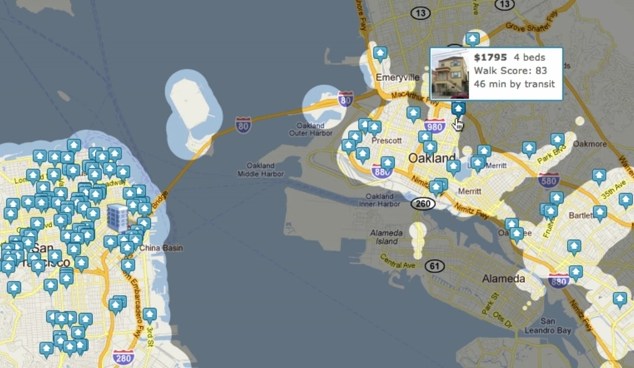You might be familiar with Walk Score, a site that crunches mapping data into a simple “walkability” score for a neighborhood or region. You know, whether food and entertainment are nearby, whether transit is available, and so on. It’s being used by more than 10,000 sites that list apartments and real estate now, providing an at-a-glance impression of how much you can expect to need your car.
They’re sitting on a ton of data from transit authorities, OpenStreetMap, and user input, and have decided to leverage that into a more user-centric tool, Apartment Search. It basically turns the telescope around; instead of taking a place you like and providing a commute and walkability score, you put in your workplace and desired commute, and it finds places for you within that trip time. And it looks really cool while doing it.
To be honest, when I heard of Walk Score back in the day, I didn’t trust it. Still don’t, really. Anecdotes about walkability from friends I’d trust, and my own feet, but standardizing this vague concept has always seemed a suspicious enterprise to me. But this repurposing of the data makes perfect sense. Here’s a video so you can see what the service looks like:
It should also be live right now at Walk Score’s site. The way it spreads reminds me of an unstoppable contagion in a Hollywood White House briefing. “In 45 minutes the zombies could be as far as Ballard, sir. Which is a tragedy because that neighborhood was really starting to come up. Great farmer’s market and vintage stores.”
Really, though, this seems a more relevant statistic to me than the actual Walk Score. Gauging commute times is a touchy business, but Walk Score co-founder Matt Lerner assured me that their estimates are very carefully calculated, with padding time for walking between stations or waiting for trains. It calculates routes differently depending on which is best for driving, walking, busing, and such, so it’s not as simple as it looks. Express trains, shortcuts through parks, it’s all in there.

The presentation is what makes me like it, though. The active involvement of the user and dynamic visual representation of the data are satisfying and practical. It aids in discovery, and of course those little rich apartment listings (you can filter by price, size, etc.) are easy to browse and easy for Walk Score to monetize.
What’s not to like? Well, it’s not very mobile. It would be nice to be able to save a neighborhood, directions, and a few interesting apartments to a mobile apartment finder app. They may also have a hard time drawing users in, since this service is more centralized on the Walk Score site and isn’t quite as universally embeddable.
You can give it a try right now and see how their estimates stack up against your known commute times, and also see where you could be living. As for me, my neighborhood is a “walker’s paradise” and my commute is about ten steps, so I’ll be staying where I am.
